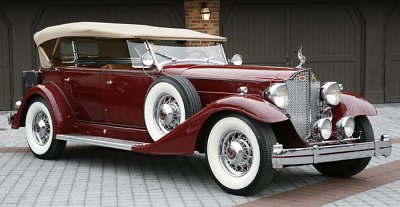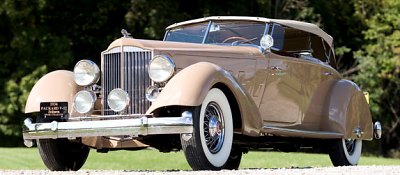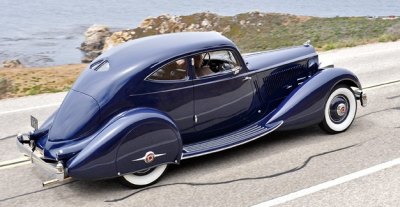 Packard
jumped to the premier league of luxury motoring with the 12-cylinder
Twin Six in 1915-1923. However, the V12 was expensive to build. To
increase sales and attract wider audiences it turned to use cheaper 6
and 8-cylinder inline engines. Cheaper new models helped it to survive
the Great Depression triggered by the 1929 Wall Street crash (its
rivals Pierce-Arrow and Peerless were not so lucky), but by the time
Cadillac introduced V16 in 1930 and V12 a year later, Packard felt it
had to respond in order to keep its status as the top American luxury
car brand. The answer was a new generation V12 model, which was called
Twin Six again in the first model year and then renamed to Twelve in
order to distinguish from the lesser six-cylinder models.
 The Twelve was conservatively styled, but it looked graceful
and pleasing to the rich people that could afford it. Again it was
available in various body styles, including some specials from
coachbuilders. As the chassis alone weighed 1900 kg, the whole car was
guaranteed to exceed 2300 kg, or even 2600 kg in the heftiest versions.
The V12 was all-new but the technology it employed changed little from
the last Twin Six. An L-shape cylinder head breathed through side
valves that were driven by a single camshaft located in the V through
rockers. The V-angle was widened slightly to 67 degrees. Displacement
increased to 445 cubic inches or 7.3 liters. Its 160 hp output lagged
behind the 175 hp Cadillac V16, let alone the 320 supercharging
horsepower of Duesenberg SJ, but it guaranteed peerless smoothness and
quietness. Output increased to 175 hp in 1935 with new aluminum
cylinder heads and a displacement increased to 473 cu (7.8 liters), by
now the Twelve could top 100 mph.
 No, the Twelve was never renowned for performance or
innovations. What
it achieved were the best craftsmanship, materials, customization and running
refinement. It represented the golden era of American luxury cars. |